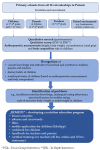Nutrition-Related Knowledge, Diet Quality, Lifestyle, and Body Composition of 7-12-Years-Old Polish Students: Study Protocol of National Educational Project Junior-Edu-Żywienie (JEŻ)
- PMID: 38201834
- PMCID: PMC10780563
- DOI: 10.3390/nu16010004
Nutrition-Related Knowledge, Diet Quality, Lifestyle, and Body Composition of 7-12-Years-Old Polish Students: Study Protocol of National Educational Project Junior-Edu-Żywienie (JEŻ)
Abstract
Increasing students' nutrition knowledge is an important goal of school education which may improve their lifestyle and consequently reduce the incidence of non-communicable chronic diseases, including obesity. This research aimed at assessing the dietary habits, nutrition-related knowledge and attitudes, and nutritional status of Polish students aged 7-12 years. Additional objectives included recognizing nutrition-related knowledge among their parents and teachers as well as the school food and nutrition environment. The final goal was to develop a nutrition education program. This study protocol presents a general and detailed approach for realizing the above-mentioned issues, including conducting quantitative and qualitative research. The study was designed as cross-sectional, covering primary school students from all over Poland, including rural, town, and metropolitan areas. Data on eating habits, lifestyle, nutrition-related knowledge, and attitudes were collected with questionnaires. Measurements of body weight, height, waist and hip circumferences, and handgrip strength were performed in accordance with the International Standards for Anthropometric Assessment (ISAK) recommendations. Body composition was assessed with bioelectrical impedance analysis. Ultimately, 2218 schools from all 16 voivodeships in Poland registered for the project. In total, quantitative data were collected among 27,295 students, 17,070 parents, and 2616 teachers. Anthropometric measurements were taken among 18,521 students. The results allow us to develop a multifaceted educational program based on knowledge and adapted to the perception of students. Our research may contribute to the identification of subpopulations of children and adolescents at risk of excessive body weight and define the predictors of obesity risk in Poland.
Keywords: body composition; dietary habits; education program; nutrition-related knowledge; nutritional status; parents; pupils; teachers.
Conflict of interest statement
The authors declare no conflict of interest.
Figures
References
-
- Mohd Saat N.Z., Abd Talib R., Alarsan S.F., Saadeh N., Shahrour G. Risk Factors of Overweight and Obesity Among School Children Aged 6 to 18 Years: A Scoping Review. Nutr. Dietary Suppl. 2023;15:63–76. doi: 10.2147/NDS.S420370. - DOI
-
- Wuenstel J.W., Wądołowska L., Słowińska M.A., Niedźwiedzka E., Kowalkowska J., Antoniak L. Consumption Frequency of Fruit Juices and Sweetened Beverages: Differences Related to Age, Gender and the Prevalence of Overweight among Polish Adolescents. Pol. J. Food Nutr. Sci. 2015;65:211–221. doi: 10.2478/pjfns-2013-0013. - DOI
MeSH terms
Grants and funding
LinkOut - more resources
Full Text Sources
Medical



